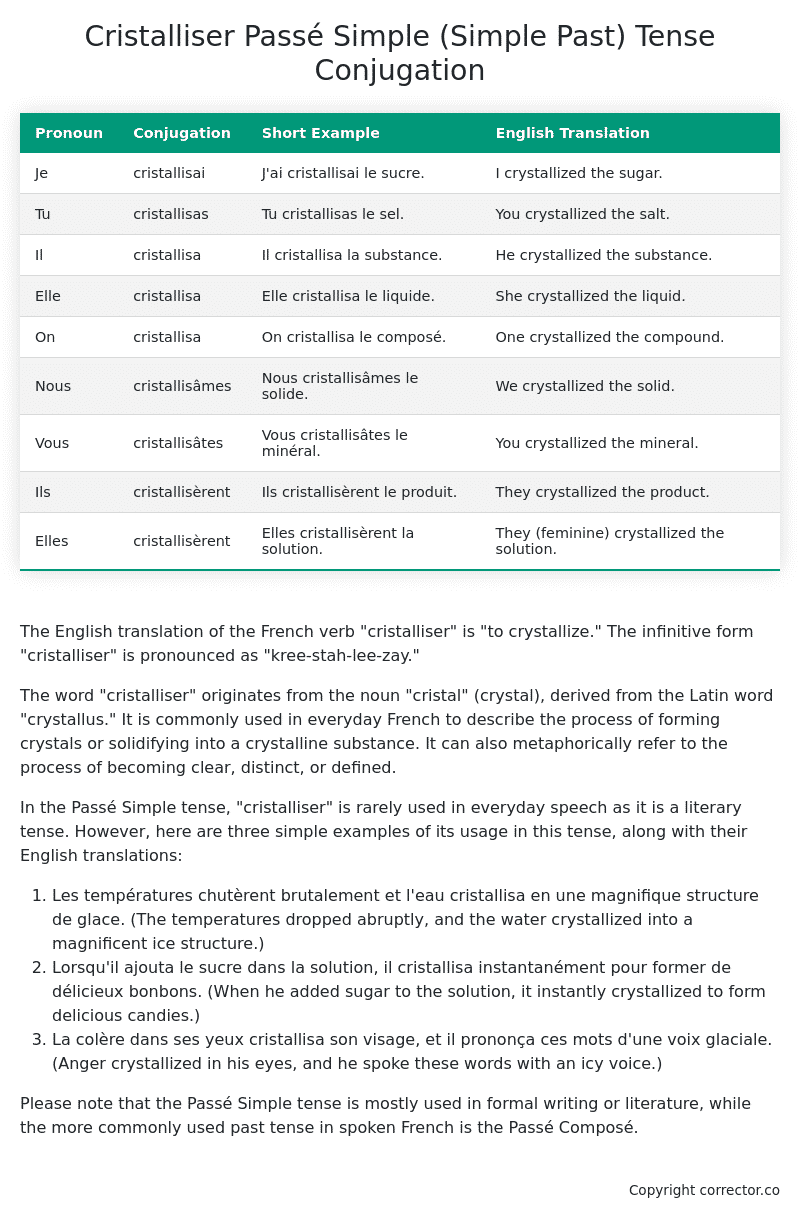Passé Simple (Simple Past) Tense Conjugation of the French Verb cristalliser
Introduction to the verb cristalliser
The English translation of the French verb “cristalliser” is “to crystallize.” The infinitive form “cristalliser” is pronounced as “kree-stah-lee-zay.”
The word “cristalliser” originates from the noun “cristal” (crystal), derived from the Latin word “crystallus.” It is commonly used in everyday French to describe the process of forming crystals or solidifying into a crystalline substance. It can also metaphorically refer to the process of becoming clear, distinct, or defined.
In the Passé Simple tense, “cristalliser” is rarely used in everyday speech as it is a literary tense. However, here are three simple examples of its usage in this tense, along with their English translations:
- Les températures chutèrent brutalement et l’eau cristallisa en une magnifique structure de glace. (The temperatures dropped abruptly, and the water crystallized into a magnificent ice structure.)
- Lorsqu’il ajouta le sucre dans la solution, il cristallisa instantanément pour former de délicieux bonbons. (When he added sugar to the solution, it instantly crystallized to form delicious candies.)
- La colère dans ses yeux cristallisa son visage, et il prononça ces mots d’une voix glaciale. (Anger crystallized in his eyes, and he spoke these words with an icy voice.)
Please note that the Passé Simple tense is mostly used in formal writing or literature, while the more commonly used past tense in spoken French is the Passé Composé.
Table of the Passé Simple (Simple Past) Tense Conjugation of cristalliser
| Pronoun | Conjugation | Short Example | English Translation |
|---|---|---|---|
| Je | cristallisai | J’ai cristallisai le sucre. | I crystallized the sugar. |
| Tu | cristallisas | Tu cristallisas le sel. | You crystallized the salt. |
| Il | cristallisa | Il cristallisa la substance. | He crystallized the substance. |
| Elle | cristallisa | Elle cristallisa le liquide. | She crystallized the liquid. |
| On | cristallisa | On cristallisa le composé. | One crystallized the compound. |
| Nous | cristallisâmes | Nous cristallisâmes le solide. | We crystallized the solid. |
| Vous | cristallisâtes | Vous cristallisâtes le minéral. | You crystallized the mineral. |
| Ils | cristallisèrent | Ils cristallisèrent le produit. | They crystallized the product. |
| Elles | cristallisèrent | Elles cristallisèrent la solution. | They (feminine) crystallized the solution. |
Other Conjugations for Cristalliser.
Le Present (Present Tense) Conjugation of the French Verb cristalliser
Imparfait (Imperfect) Tense Conjugation of the French Verb cristalliser
Passé Simple (Simple Past) Tense Conjugation of the French Verb cristalliser (You’re reading it right now!)
Passé Composé (Present Perfect) Tense Conjugation of the French Verb cristalliser
Futur Simple (Simple Future) Tense Conjugation of the French Verb cristalliser
Futur Proche (Near Future) Tense Conjugation of the French Verb cristalliser
Plus-que-parfait (Pluperfect) Tense Conjugation of the French Verb cristalliser
Passé Antérieur (Past Anterior) Tense Conjugation of the French Verb cristalliser
Futur Antérieur (Future Anterior) Tense Conjugation of the French Verb cristalliser
Subjonctif Présent (Subjunctive Present) Tense Conjugation of the French Verb cristalliser
Subjonctif Passé (Subjunctive Past) Tense Conjugation of the French Verb cristalliser
Subjonctif Imparfait (Subjunctive Imperfect) Tense Conjugation of the French Verb cristalliser
Conditionnel Présent (Conditional Present) Tense Conjugation of the French Verb cristalliser
Conditionnel Passé (Conditional Past) Tense Conjugation of the French Verb cristalliser
Conditionnel Passé II (Conditional Past II) Tense Conjugation of the French Verb cristalliser
L’impératif Présent (Imperative Present) Tense Conjugation of the French Verb cristalliser
L’impératif Passé (Imperative Past) Tense Conjugation of the French Verb cristalliser
L’infinitif Présent (Infinitive Present) Tense Conjugation of the French Verb cristalliser
L’infinitif Passé (Infinitive Past) Tense Conjugation of the French Verb cristalliser
Le Participe Présent (Present Participle) Tense Conjugation of the French Verb cristalliser
Le Participe Passé (Past Participle) Tense Conjugation of the French Verb cristalliser
Struggling with French verbs or the language in general? Why not use our free French Grammar Checker – no registration required!
Get a FREE Download Study Sheet of this Conjugation 🔥
Simply right click the image below, click “save image” and get your free reference for the cristalliser Passé Simple tense conjugation!

Cristalliser – About the French Passé Simple (Simple Past) Tense
Formation
Usage
Narration
Historical Context
Interactions with other tenses
Passé Composé
Imparfait
Conditional and Subjunctive
Summary
I hope you enjoyed this article on the verb cristalliser. Still in a learning mood? Check out another TOTALLY random French verb conjugation!


